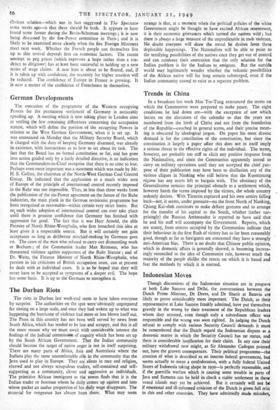Trends in China
In a broadcast last week Mao Tse-Tung announced the terms on which the Communists were prepared to make peace. The eight conditions he laid down are—with the exception of one which insists on the alteration of the calendar so that the years are numbered from the birth of Christ and not from the foundation of the Republic—couched in general terms, and their precise mean- ing is obscured by ideological jargon. On paper his most drastic demand is for the cancellation of the constitution, but since the constitution is largely a paper affair this does not in itself imply a serious threat to the effective rights of the individual. The terms, however, are probably too stiff to elicit any positive response from the Nationalists, and since the Communists apparently intend to carry on military operations until they are accepted the chief pur- pose of their publication may have been to disillusion any of the various cliques in Nanking who still believe that the Kuomintang regime has any assets left to bargain with. The obstinacy of the Generalissimo remains the principal obstacle to a settlement which, however harsh the terms imposed by the victors, the whole country ardently desires. With Tientsin captured and his own armies falling back—not, it seems, under pressure—on the front North of Nanking, Chiang Kai-shek continues to make defiant gestures and to arrange for the transfer of his capital to the South, whither (rather sur- prisingly) the Russian Ambassador is reported to have said that he and his staff will accompany the Government. Reports, which are scanty, from centres occupied by the Communists indicate that their behaviour in the first flush of victory has so far been reasonably good, though as far as foreigners are concerned they have a strongly anti-American bias. There is no doubt that Chinese public opinion, which in domestic affairs is generally shrewd, is becoming increas- ingly reconciled to the idea of Communist rule, however much the majority of the people dislike the tenets on which it is based and fear the methods by which it is exerted.






































 Previous page
Previous page